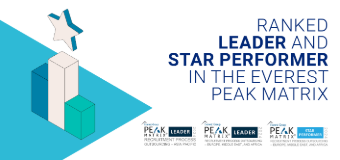Hays latest Everest PEAK Matrix Rankings
BLOG

Hays latest Everest PEAK Matrix Rankings

Hays latest rankings in the Everest Group PEAK Matrix 2024
We are delighted to have been named as a Leader in both EMEA and APAC and Star Performer in EMEA of the Recruitment Process Outsourcing (RPO) Services PEAK Matrix® Assessment 2024.
The assessment framework evaluates 26 RPO providers in EMEA and 27 in APAC based on their market impact, value delivered, scope of services, vision and capabilities, innovation and investment, and delivery footprint.
Everest Group selects Star Performers based on the relative year-on-year improvement in the PEAK Matrix, reflecting our commitment to meaningful innovation and our dedication to adding value to our partners in the EMEA region.
Resilience and expertise shine in EMEA and APAC
Commenting on our rankings Arkadev Basak, Partner at Everest Group, says:
“Despite challenging market conditions, Hays has performed very well in EMEA in 2023 and continued to demonstrate its expertise in hiring both blue collar and white collar roles across the region.
"Its organic investments to augment its technological capabilities, alongside its inorganic investments to further deepen its consulting offering by acquiring Vercida Consulting, have helped it to solidify its position as a Leader and Star Performer in Everest Group's Recruitment Process Outsourcing (RPO) Services PEAK Matrix® Assessment 2024 - EMEA.
"Hays has continued to create significant impact in Asia Pacific RPO market with its delivery capabilities in the region, coupled with its experience in manufacturing, government, and the BFSI domain.
"Hays has continued to create significant impact in Asia Pacific RPO market with its delivery capabilities in the region, coupled with its experience in manufacturing, government, and the BFSI domain.
"Its domain expertise, total talent acquisition capabilities, and value-added offerings have helped it secure its position as a Leader in Everest Group's Recruitment Process Outsourcing (RPO) Services PEAK Matrix® Assessment 2024 - Asia Pacific."
Strategic growth & strengthening our DE&I services
Nigel Kirkham, CEO of Enterprise Solutions at Hays, says:
"Being recognised by Everest Group as a Leader in both EMEA and APAC, and as a Star Performer in EMEA, underscores our relentless pursuit of excellence and innovation in RPO services for our clients and partners in these regions and beyond. This accomplishment highlights our continuous efforts to provide businesses with workforce solutions tailored to their needs.
"Consistently ranking in the elite echelons of the PEAK Matrix reflects our collaborative spirit, commitment to integrating top-tier client-facing technology, and unwavering dedication to exceptional service.
“Strategic investments, including our partnership with FAIRER Consulting, have solidified our position and significantly strengthened our service offering in the DE&I arena.”
“This success belongs to every member of our Global, APAC and EMEA teams. Their hard work, dedication, and commitment have been instrumental, and we couldn’t be prouder of their contributions.”
Explore the potential of RPO
At Hays, our Enterprise Solutions is committed to helping both organisations and individuals succeed as their lifelong partner. We leverage our deep market knowledge and expertise to build holistic talent strategies for thousands of complex organisations around the world, offering a comprehensive suite of workforce and advisory services.
You can learn more about our services in our Introductory Guide to Successful RPO. The playbook delivers all you need to know, whether you're new to RPO or want to better understand how it can benefit your specific business.
